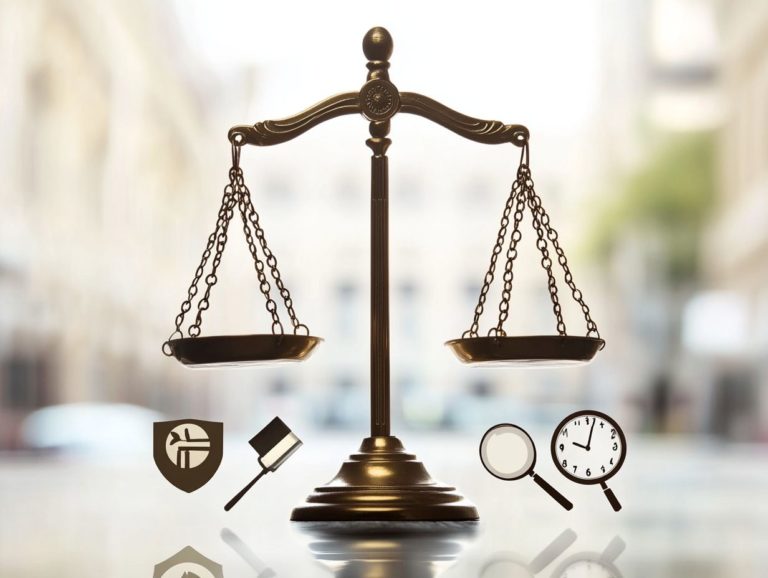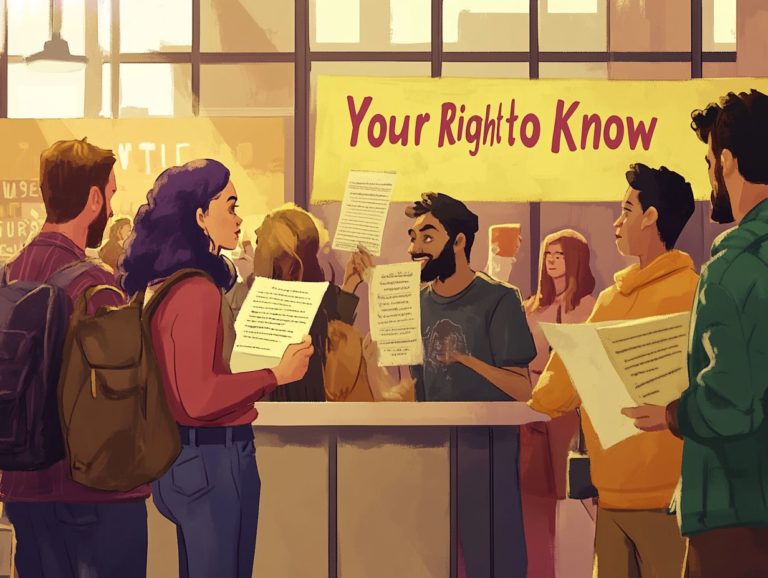The Right to Remain Silent: What It Means
The Fifth Amendment serves as a cornerstone of American legal rights, shielding individuals from self-incrimination and guaranteeing fair treatment under the law.
At its essence is the invaluable Right to Remain Silent, a powerful asset that can protect your freedom during legal encounters.
This article delves into the significance of this right, explaining when it can be invoked and the potential repercussions of failing to exercise it.
Discover how to effectively assert this vital protection and deftly navigate the complexities of your rights in any legal situation.
Contents
Key Takeaways:

The Fifth Amendment guarantees your right to remain silent in legal proceedings, protecting you from self-incrimination.
This right lets you choose not to answer questions or provide information that may be used against you in court.
You can invoke this right at any time during a legal interaction, including police questioning or in court. Failing to do so can have serious legal consequences.
The Fifth Amendment and the Right to Remain Silent
The Fifth Amendment of the United States Constitution guarantees you the right to remain silent, shielding you from self-incrimination during police questioning and questioning by police after you ve been taken into custody.
This essential legal principle emerged from the landmark Supreme Court case, Miranda v. Arizona. This case established the Miranda Warning, which requires law enforcement to inform you of your rights, including your right to legal counsel and your ability to refuse to speak to avoid providing incriminating evidence.
The significance of this amendment cannot be overstated; it stands as a cornerstone of American criminal rights, ensuring protection against coercive interrogation tactics.
Overview of the Fifth Amendment
The Fifth Amendment offers you several crucial protections, including your right against self-incrimination and the promise of due process under the law.
Ratified in 1791 as part of the Bill of Rights, this amendment emerged from a historical need to shield citizens from governmental overreach and ensure fair treatment in the legal system.
It addresses various scenarios, such as police encounters. You can assert your right to remain silent to avoid self-incrimination. The due process clause guarantees that legal proceedings are conducted fairly, protecting you from arbitrary actions by the state.
These principles protect your rights and ensure a fair legal system.
Understanding the Right to Remain Silent
Grasping the right to remain silent is essential for anyone confronted by police questioning. This right protects you against self-incrimination during custodial interrogations.
Often linked to the Miranda Warning, this right gives you the power to decline answering questions that could potentially jeopardize your legal standing.
The core of this right is about upholding the integrity of the legal process and ensuring that no individual is unduly coerced into confessing to crimes they didn t commit.
What It Means and How It Works

The Fifth Amendment protects your right to remain silent. It gives you the power to refuse to answer any questions posed by law enforcement, allowing you to steer clear of potential self-incrimination.
If you find yourself in a police interrogation regarding a serious crime, invoking this right can safeguard you from making admissions or statements that could later be used against you in court.
Consider situations where you might be uncertain about your legal standing or feel that any response could inadvertently place you in a compromising position regarding criminal activities. This right not only protects the accused but also carries significant implications for the attorney-client relationship.
It highlights the critical importance of open communication between you and your lawyer, creating an environment where your legal representation can thrive without the fear of jeopardizing your defense.
When Can You Invoke the Right to Remain Silent?
You have the right to remain silent during custodial interrogations, particularly when faced with questioning by a police officer. Exercising this right safeguards you from getting yourself in trouble and helps protect you from potential legal issues in a criminal case.
Instances Where the Right Applies
The right to remain silent is essential and applies in various situations, especially during police questioning and when you are in custody.
This legal principle is especially important when you re being questioned in connection with an investigation but haven t been formally charged with a crime. In moments where you might accidentally share information that could be used against you, knowing how to invoke this right can effectively protect you.
Landmark cases like Miranda v. Arizona highlight the necessity for law enforcement to inform you of your rights before any interrogation begins. This ensures you are aware of your ability to remain silent and the potential consequences of speaking.
This protection also applies to situations where your statements could lead to criminal charges, emphasizing the ongoing importance of the right to remain silent within the justice system.
Consequences of Not Remaining Silent
Remaining silent during police questioning is crucial; failing to do so can lead to serious legal repercussions. By speaking without careful consideration, you risk inadvertently providing incriminating evidence that could significantly impact your case.
Legal Ramifications and Protections

The legal consequences of not invoking your right to remain silent can be severe. It often leads to the admission of self-incriminating evidence that can be used against you in court. If you choose not to exercise this right, your statements can undermine your defense credibility in future legal proceedings.
On the other hand, if you invoke your right to remain silent, you gain significant legal protections. Your silence cannot be taken as an admission of guilt and can be pivotal in shaping the course of the trial. This highlights the importance of knowing your rights during police encounters and thinking critically before engaging in any discussions with law enforcement.
How to Properly Invoke the Right to Remain Silent
To effectively invoke your right to remain silent, you must clearly refuse to speak during police questioning. It’s essential to communicate your intent to the officer, which can even be conveyed through non-verbal cues when necessary.
Steps to Take and Pitfalls to Avoid
When you decide to invoke your right to remain silent, it s vital to understand the steps to take and the pitfalls to avoid.
- Clearly state your intention not to answer questions. Use phrases like “I am exercising my right to remain silent,” and make this declaration calmly and respectfully.
- Be mindful of your body language; avoid non-verbal cues that might suggest you’re open to engagement, such as nodding or eye contact.
- A common mistake is inadvertently answering questions or providing any information, which can undermine your intention to remain silent.
- Seeking legal counsel is highly advisable; an attorney can guide you on how to handle the situation and protect your rights.
Being well-informed about your legal protections can bolster the confidence needed to maintain your silence.
Frequently Asked Questions
What Does It Mean to Remain Silent?

The right to remain silent is a constitutional right that protects individuals from being forced to make self-incriminating statements during a criminal investigation or trial.
If you find yourself in a situation involving law enforcement, it’s essential to seek legal advice.
Why is the right to remain silent important?
The right to remain silent is crucial. It protects individuals from having to share information that could hurt them in court. This right supports the Fifth Amendment, which prevents self-incrimination.
When can I exercise my right to remain silent?
You can exercise this right at any time during a criminal investigation or trial. This includes police questioning and court proceedings.
Do I have to say anything to the police if I am arrested?
No, you don t have to talk to the police if you’re arrested. It’s best to stay silent until you’ve spoken with a lawyer.
Can my silence be used against me in court?
No, your silence cannot be used against you in court. The Fifth Amendment guarantees your right to remain silent without it being seen as evidence of guilt.
Are there any exceptions to the right to remain silent?
Yes, there are exceptions. If you talk to the police voluntarily and then choose to remain silent, that silence could be used against you. Also, in some cases, a judge may require you to speak if you have immunity.






